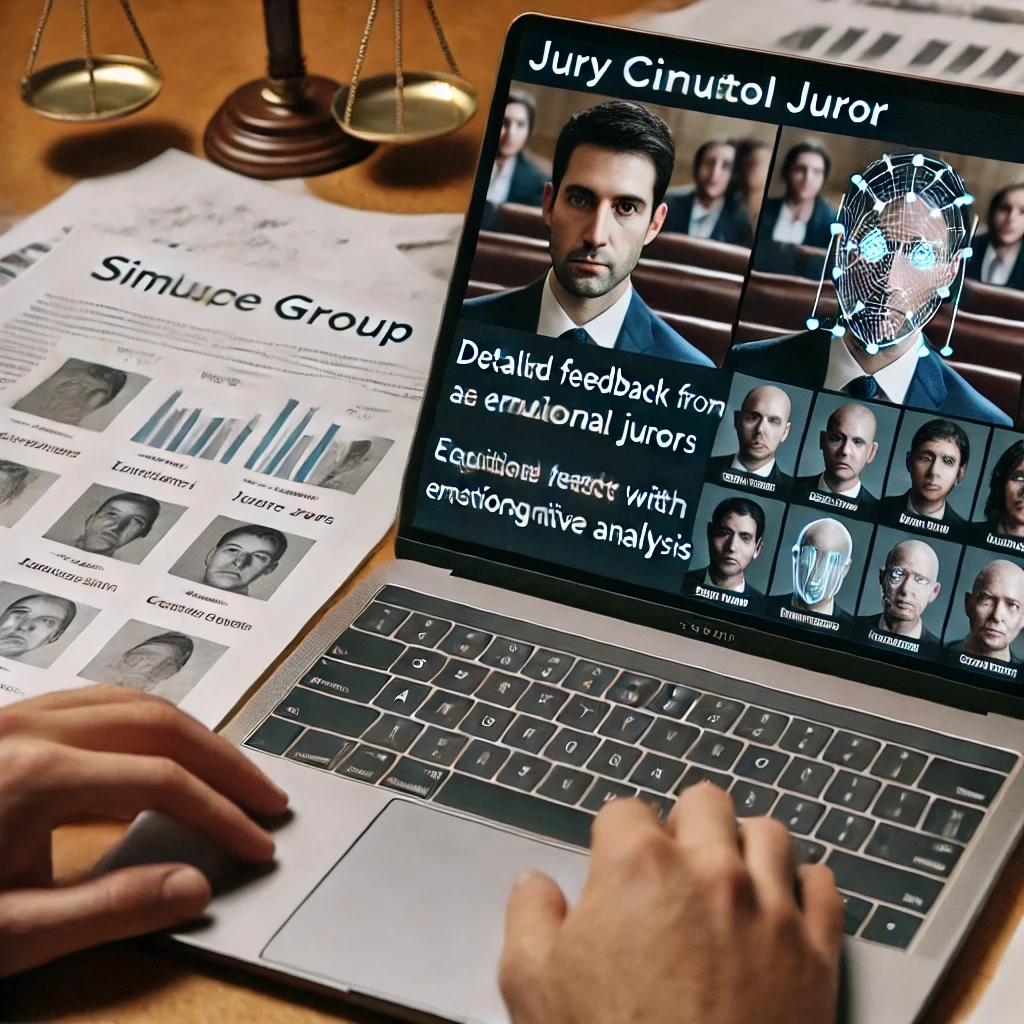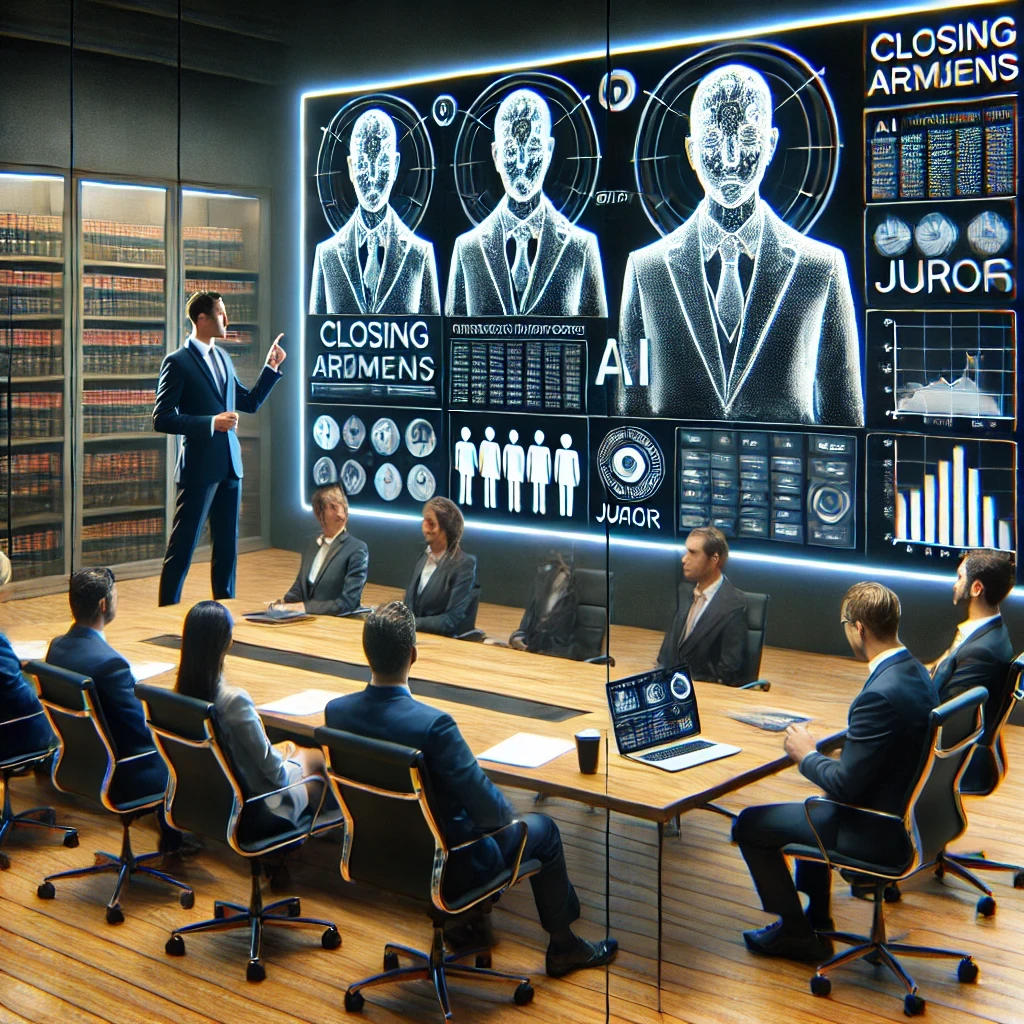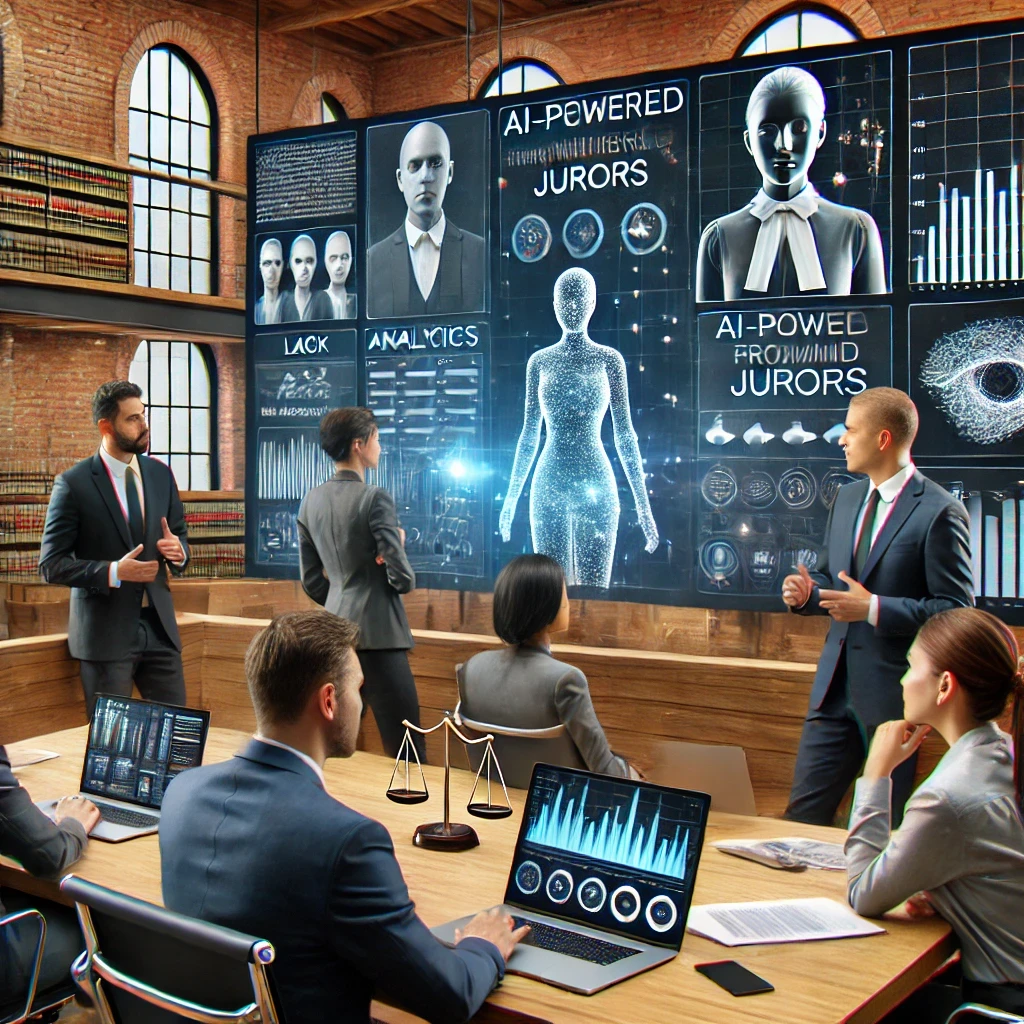How Synthetic Juror Saved Laurel A. Hundreds of Hours and Discovered Hidden Gems Missed by Focus Groups
How Synthetic Juror Saved Laurel A. Hundreds of Hours and Discovered Hidden Gems Missed by Focus Groups
Oct 10, 2024
Testimonial

Synthetic Juror transformed jury consultant Laurel A's trial preparation by saving her hundreds of hours and uncovering critical insights that traditional focus groups missed. Using AI to simulate real-time juror feedback, Laurel was able to fine-tune her legal strategies far more efficiently than before. The platform's geo-specific simulations and instant analysis provided nuanced, tailored responses that traditional methods couldn’t capture. Laurel's experience highlights how AI can enhance legal professionals’ capabilities, offering time savings, deeper insights, and a competitive edge in trial preparation.
In the legal world, time is a scarce resource. Jury consultants like Laurel A. are well-acquainted with this reality, as they often spend countless hours organizing and running focus groups to get a sense of how real jurors might react to evidence in high-stakes cases. But traditional methods, while valuable, are not always efficient or comprehensive. That’s where Synthetic Juror comes in—a revolutionary AI-driven platform designed to transform how legal teams prepare for trials.
Laurel’s recent experience with Synthetic Juror was eye-opening. After investing weeks into a traditional focus group, she decided to compare the results with Synthetic Juror’s insights. The AI not only saved her hundreds of hours but also uncovered hidden gems—eight critical pieces of juror feedback—that her focus group completely missed.
Let’s explore how Synthetic Juror reshaped Laurel’s trial preparation, saved time, and improved the quality of her insights.
The Efficiency Dilemma: Hours Spent, Value Lost
Trial preparation has always been labor-intensive. Focus groups, in particular, require substantial time and effort—from organizing the participants to facilitating the discussions and analyzing the data. For Laurel, this traditional method meant weeks of work for each case. In contrast, Synthetic Juror provided her with actionable feedback in real-time, trimming what used to be a laborious process down to hours.
The latest *Legal Trends Report* highlights this growing inefficiency across the legal sector, stating that nearly 74% of law firm tasks, including jury research and analysis, are ripe for automation【11†source】. Synthetic Juror aligns with this trend by automating the process of simulating juror behavior, allowing legal teams like Laurel's to focus on higher-level tasks.
Instead of scheduling and running multiple focus groups, Laurel was able to interact with thousands of AI-generated jurors in a matter of hours. The result? A savings of over 200 hours of preparation time on just one case.
Real-Time, Geo-Specific Insights
One of the standout features of Synthetic Juror is its ability to simulate real juror panels based on the local demographic and psychosocial factors of the actual trial location【9†source】. This geo-specific simulation was a game-changer for Laurel.
In her traditional focus groups, finding jurors who mirrored the local population was difficult, expensive, and often imprecise. Synthetic Juror solved this by instantly creating a pool of virtual jurors who were tuned to the exact biases, preferences, and cultural touch points of the trial location.
Laurel was able to simulate multiple jury pools across different jurisdictions in minutes, something that would have been impossible to do with human jurors in the same timeframe.

Discovering Hidden Gems: 8 Key Insights Missed by Focus Groups
In addition to saving time, Synthetic Juror uncovered eight crucial insights that her focus group overlooked entirely. These “hidden gems” were buried deep in the data, too subtle or complex to surface during traditional discussions. For example, one AI juror raised a concern about the framing of expert testimony, which seemed minor on the surface but had the potential to shift the entire trial narrative.
Laurel described this moment as “a breakthrough.” In her conversation with Jordan Bowerman, co-founder of Synthetic Juror, she emphasized how these nuanced observations had previously gone unnoticed despite weeks of focus group work.
The Power of Instant Feedback and Real-Time Analysis
Another key advantage Synthetic Juror offered Leticia was real-time analysis. Traditional focus groups require time to collect and process feedback—typically days or even weeks after the session. With Synthetic Juror, Laurel received feedback instantly as she tested different arguments, evidentiary submissions, and even potential closing statements【10†source】.
This ability to get instant, actionable insights was particularly helpful during trial preparation, as it allowed Laurel and her team to quickly refine their strategies based on juror reactions. “It’s like having a superpower,” she said, “being able to adjust on the fly, knowing exactly how a panel of jurors might respond.”
This is a key selling point for jury consultants, especially during high-stakes cases where every minute counts. Synthetic Juror’s real-time feedback loop allows legal teams to continuously test and refine their strategies, leading to stronger, more polished arguments when it matters most【10†source】.
Scalability and Customization: From Traditional to Creative Applications
In the legal field, no two cases are the same, and neither are the juries. Synthetic Juror’s flexibility allows legal professionals to tailor their approach for different trial types. Whether it’s a traditional jury trial or a more creative application like a “ghost juror” panel, Synthetic Juror can be customized to meet a wide range of legal scenarios【9†source】【10†source】.
For Laurel, this meant scaling her efforts effortlessly. Instead of running multiple focus groups for different segments of the jury pool, she was able to simulate a variety of juror profiles simultaneously. This scalability helped her uncover more diverse perspectives, further enriching her trial preparation.
In one particular case, Laurel created several different jury profiles, each representing various demographic groups within the trial’s jurisdiction. She found that while one group responded positively to her client’s expert testimony, another group remained skeptical—a dynamic she wouldn’t have discovered using traditional focus groups.
Complementing Existing Tools
One of the main challenges of adopting new technology is ensuring it integrates smoothly with existing tools. Laurel had concerns that using Synthetic Juror would mean abandoning the other systems she relied on. However, she was pleasantly surprised to find that the platform integrated seamlessly with her firm’s Slack-based collaboration tools【10†source】.
Through Slack, Laurel could present evidence, depositions, and even closing arguments to her AI juror panel directly from the same interface her team used for daily communications. This level of integration made the transition smooth, allowing her team to continue their work without disruption.
For other jury consultants or law firms considering adopting Synthetic Juror, this integration offers a major advantage. There’s no need to overhaul existing workflows—Synthetic Juror fits right in.
An Expert’s Competitive Edge
In a conversation with Jordan Bowerman, Laurel highlighted how using Synthetic Juror has not only improved her trial preparation but also enhanced her credibility within the legal community. As a cutting-edge tool embraced by leading consultants like Laurel, Synthetic Juror is quickly gaining recognition as a must-have resource for legal professionals.
By using the platform, Laurel has positioned herself as an expert who embraces the latest AI advancements. This has opened doors to peer networking opportunities, conference presentations, and new client engagements. In the competitive field of jury consulting, being known as someone who uses cutting-edge tools can be a significant advantage.

AI Trends and the Future of Legal Preparation
The benefits Laurel experienced with Synthetic Juror are part of a broader trend in the legal industry: the rapid adoption of AI to enhance efficiency and precision. According to a recent report, 79% of legal professionals are now using AI in some capacity, with one in four firms adopting it universally【11†source】.
AI is transforming not just how law firms operate but also how they prepare for trials, conduct legal research, and even negotiate settlements. With nearly three-quarters of law firm tasks exposed to automation, the potential for AI-driven solutions like Synthetic Juror to streamline trial preparation is immense【11†source】.
The adoption of AI is not just a trend—it’s becoming the new normal. Firms that fail to integrate AI tools risk falling behind, while those that do are likely to see increased efficiency, higher-quality work, and improved outcomes for their clients.
Conclusion: A Game-Changer for Jury Consultants
Laurel's experience with Synthetic Juror is a testament to the platform’s power. By saving her hundreds of hours and uncovering critical insights missed by traditional focus groups, Synthetic Juror has proven itself to be a game-changer in jury consulting.
The combination of real-time feedback, scalability, customization, and seamless integration with existing tools makes Synthetic Juror an indispensable resource for legal professionals looking to modernize their trial preparation. For consultants like Laurel, embracing AI is not just about staying competitive—it’s about delivering better, faster, and more insightful results than ever before.
In the legal world, time is a scarce resource. Jury consultants like Laurel A. are well-acquainted with this reality, as they often spend countless hours organizing and running focus groups to get a sense of how real jurors might react to evidence in high-stakes cases. But traditional methods, while valuable, are not always efficient or comprehensive. That’s where Synthetic Juror comes in—a revolutionary AI-driven platform designed to transform how legal teams prepare for trials.
Laurel’s recent experience with Synthetic Juror was eye-opening. After investing weeks into a traditional focus group, she decided to compare the results with Synthetic Juror’s insights. The AI not only saved her hundreds of hours but also uncovered hidden gems—eight critical pieces of juror feedback—that her focus group completely missed.
Let’s explore how Synthetic Juror reshaped Laurel’s trial preparation, saved time, and improved the quality of her insights.
The Efficiency Dilemma: Hours Spent, Value Lost
Trial preparation has always been labor-intensive. Focus groups, in particular, require substantial time and effort—from organizing the participants to facilitating the discussions and analyzing the data. For Laurel, this traditional method meant weeks of work for each case. In contrast, Synthetic Juror provided her with actionable feedback in real-time, trimming what used to be a laborious process down to hours.
The latest *Legal Trends Report* highlights this growing inefficiency across the legal sector, stating that nearly 74% of law firm tasks, including jury research and analysis, are ripe for automation【11†source】. Synthetic Juror aligns with this trend by automating the process of simulating juror behavior, allowing legal teams like Laurel's to focus on higher-level tasks.
Instead of scheduling and running multiple focus groups, Laurel was able to interact with thousands of AI-generated jurors in a matter of hours. The result? A savings of over 200 hours of preparation time on just one case.
Real-Time, Geo-Specific Insights
One of the standout features of Synthetic Juror is its ability to simulate real juror panels based on the local demographic and psychosocial factors of the actual trial location【9†source】. This geo-specific simulation was a game-changer for Laurel.
In her traditional focus groups, finding jurors who mirrored the local population was difficult, expensive, and often imprecise. Synthetic Juror solved this by instantly creating a pool of virtual jurors who were tuned to the exact biases, preferences, and cultural touch points of the trial location.
Laurel was able to simulate multiple jury pools across different jurisdictions in minutes, something that would have been impossible to do with human jurors in the same timeframe.

Discovering Hidden Gems: 8 Key Insights Missed by Focus Groups
In addition to saving time, Synthetic Juror uncovered eight crucial insights that her focus group overlooked entirely. These “hidden gems” were buried deep in the data, too subtle or complex to surface during traditional discussions. For example, one AI juror raised a concern about the framing of expert testimony, which seemed minor on the surface but had the potential to shift the entire trial narrative.
Laurel described this moment as “a breakthrough.” In her conversation with Jordan Bowerman, co-founder of Synthetic Juror, she emphasized how these nuanced observations had previously gone unnoticed despite weeks of focus group work.
The Power of Instant Feedback and Real-Time Analysis
Another key advantage Synthetic Juror offered Leticia was real-time analysis. Traditional focus groups require time to collect and process feedback—typically days or even weeks after the session. With Synthetic Juror, Laurel received feedback instantly as she tested different arguments, evidentiary submissions, and even potential closing statements【10†source】.
This ability to get instant, actionable insights was particularly helpful during trial preparation, as it allowed Laurel and her team to quickly refine their strategies based on juror reactions. “It’s like having a superpower,” she said, “being able to adjust on the fly, knowing exactly how a panel of jurors might respond.”
This is a key selling point for jury consultants, especially during high-stakes cases where every minute counts. Synthetic Juror’s real-time feedback loop allows legal teams to continuously test and refine their strategies, leading to stronger, more polished arguments when it matters most【10†source】.
Scalability and Customization: From Traditional to Creative Applications
In the legal field, no two cases are the same, and neither are the juries. Synthetic Juror’s flexibility allows legal professionals to tailor their approach for different trial types. Whether it’s a traditional jury trial or a more creative application like a “ghost juror” panel, Synthetic Juror can be customized to meet a wide range of legal scenarios【9†source】【10†source】.
For Laurel, this meant scaling her efforts effortlessly. Instead of running multiple focus groups for different segments of the jury pool, she was able to simulate a variety of juror profiles simultaneously. This scalability helped her uncover more diverse perspectives, further enriching her trial preparation.
In one particular case, Laurel created several different jury profiles, each representing various demographic groups within the trial’s jurisdiction. She found that while one group responded positively to her client’s expert testimony, another group remained skeptical—a dynamic she wouldn’t have discovered using traditional focus groups.
Complementing Existing Tools
One of the main challenges of adopting new technology is ensuring it integrates smoothly with existing tools. Laurel had concerns that using Synthetic Juror would mean abandoning the other systems she relied on. However, she was pleasantly surprised to find that the platform integrated seamlessly with her firm’s Slack-based collaboration tools【10†source】.
Through Slack, Laurel could present evidence, depositions, and even closing arguments to her AI juror panel directly from the same interface her team used for daily communications. This level of integration made the transition smooth, allowing her team to continue their work without disruption.
For other jury consultants or law firms considering adopting Synthetic Juror, this integration offers a major advantage. There’s no need to overhaul existing workflows—Synthetic Juror fits right in.
An Expert’s Competitive Edge
In a conversation with Jordan Bowerman, Laurel highlighted how using Synthetic Juror has not only improved her trial preparation but also enhanced her credibility within the legal community. As a cutting-edge tool embraced by leading consultants like Laurel, Synthetic Juror is quickly gaining recognition as a must-have resource for legal professionals.
By using the platform, Laurel has positioned herself as an expert who embraces the latest AI advancements. This has opened doors to peer networking opportunities, conference presentations, and new client engagements. In the competitive field of jury consulting, being known as someone who uses cutting-edge tools can be a significant advantage.

AI Trends and the Future of Legal Preparation
The benefits Laurel experienced with Synthetic Juror are part of a broader trend in the legal industry: the rapid adoption of AI to enhance efficiency and precision. According to a recent report, 79% of legal professionals are now using AI in some capacity, with one in four firms adopting it universally【11†source】.
AI is transforming not just how law firms operate but also how they prepare for trials, conduct legal research, and even negotiate settlements. With nearly three-quarters of law firm tasks exposed to automation, the potential for AI-driven solutions like Synthetic Juror to streamline trial preparation is immense【11†source】.
The adoption of AI is not just a trend—it’s becoming the new normal. Firms that fail to integrate AI tools risk falling behind, while those that do are likely to see increased efficiency, higher-quality work, and improved outcomes for their clients.
Conclusion: A Game-Changer for Jury Consultants
Laurel's experience with Synthetic Juror is a testament to the platform’s power. By saving her hundreds of hours and uncovering critical insights missed by traditional focus groups, Synthetic Juror has proven itself to be a game-changer in jury consulting.
The combination of real-time feedback, scalability, customization, and seamless integration with existing tools makes Synthetic Juror an indispensable resource for legal professionals looking to modernize their trial preparation. For consultants like Laurel, embracing AI is not just about staying competitive—it’s about delivering better, faster, and more insightful results than ever before.
Here are a few sources for statistics related to the blog topic:
1. Legal Trends Report 2024 - This report discusses the adoption of AI in the legal industry, with 79% of legal professionals using AI in some capacity and 74% of law firm tasks having automation potential【9,10,11†source】.
2. Clio Legal Trends Report 2024 - Offers insights into AI's impact on law firm operations, highlighting that AI could automate nearly three-quarters of billable work【8,9,11†source】.
3. McKinsey & Company AI Adoption Survey- Found that 72% of organizations, including law firms, have adopted AI, with a quarter of law firms using AI widely【10,11†source】.
4. Goldman Sachs AI Study (2023) - States that 44% of work tasks in the legal industry could be automated by AI, with the potential to replace 40% of legal industry employees【9,11†source】.
5. American Bar Association, Formal Opinion 512 (2024) - Covers the ethical obligations of using AI in law, especially the importance of charging for actual time spent when using AI tools【7,8,9,10,11†source】.

